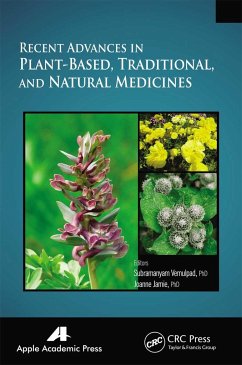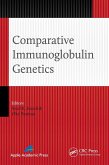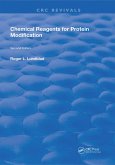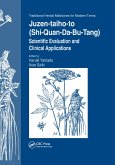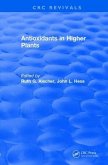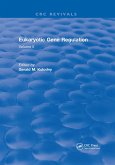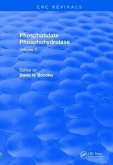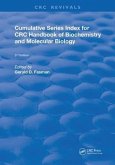Recent Advances in Plant-Based, Traditional, and Natural Medicines
Herausgeber: Vemulpad, Subramayam; Jamie, Joanne
Recent Advances in Plant-Based, Traditional, and Natural Medicines
Herausgeber: Vemulpad, Subramayam; Jamie, Joanne
- Broschiertes Buch
- Merkliste
- Auf die Merkliste
- Bewerten Bewerten
- Teilen
- Produkt teilen
- Produkterinnerung
- Produkterinnerung
The purpose of this book is to discuss several medicinal plants to find wider application in the domain of medicinal, clinical, and pharmaceutical treatment. Recent Advances in Plant-Based, Traditional, and Natural Medicines serves as a useful source of ideas and an inspiration for further cell and molecular biology research toward developing drugs and treatments from these traditional and plant-based remedies. The book covers a variety of topics and: - Considers the current state of research of traditional and plant-based medicines - Covers the current status of ethnomedicine and medicinal…mehr
Andere Kunden interessierten sich auch für
![Comparative Immunoglobulin Genetics Comparative Immunoglobulin Genetics]() Comparative Immunoglobulin Genetics104,99 €
Comparative Immunoglobulin Genetics104,99 €![Chemical Reagents for Protein Modification Chemical Reagents for Protein Modification]() Roger L LundbladChemical Reagents for Protein Modification75,99 €
Roger L LundbladChemical Reagents for Protein Modification75,99 €![Juzen-Taiho-To (Shi-Quan-Da-Bu-Tang) Juzen-Taiho-To (Shi-Quan-Da-Bu-Tang)]() Juzen-Taiho-To (Shi-Quan-Da-Bu-Tang)85,99 €
Juzen-Taiho-To (Shi-Quan-Da-Bu-Tang)85,99 €![Antioxidants in Higher Plants Antioxidants in Higher Plants]() Ruth G AlscherAntioxidants in Higher Plants36,99 €
Ruth G AlscherAntioxidants in Higher Plants36,99 €![Eukaryotic Gene Regulation Eukaryotic Gene Regulation]() Gerald M KolodnyEukaryotic Gene Regulation64,99 €
Gerald M KolodnyEukaryotic Gene Regulation64,99 €![Phosphatidate Phosphohydrolase (1988) Phosphatidate Phosphohydrolase (1988)]() David N BrindleyPhosphatidate Phosphohydrolase (1988)53,99 €
David N BrindleyPhosphatidate Phosphohydrolase (1988)53,99 €![Cumulative Series Index for CRC Handbook of Biochemistry and Molecular Biology Cumulative Series Index for CRC Handbook of Biochemistry and Molecular Biology]() Cumulative Series Index for CRC Handbook of Biochemistry and Molecular Biology74,99 €
Cumulative Series Index for CRC Handbook of Biochemistry and Molecular Biology74,99 €-
-
-
The purpose of this book is to discuss several medicinal plants to find wider application in the domain of medicinal, clinical, and pharmaceutical treatment. Recent Advances in Plant-Based, Traditional, and Natural Medicines serves as a useful source of ideas and an inspiration for further cell and molecular biology research toward developing drugs and treatments from these traditional and plant-based remedies. The book covers a variety of topics and: - Considers the current state of research of traditional and plant-based medicines - Covers the current status of ethnomedicine and medicinal plant discovery - Presents the clinical applications of traditional and plant-based medicines
Produktdetails
- Produktdetails
- Verlag: Apple Academic Press
- Seitenzahl: 398
- Erscheinungstermin: 31. März 2021
- Englisch
- Abmessung: 229mm x 152mm x 21mm
- Gewicht: 531g
- ISBN-13: 9781774633359
- ISBN-10: 1774633353
- Artikelnr.: 69923353
- Verlag: Apple Academic Press
- Seitenzahl: 398
- Erscheinungstermin: 31. März 2021
- Englisch
- Abmessung: 229mm x 152mm x 21mm
- Gewicht: 531g
- ISBN-13: 9781774633359
- ISBN-10: 1774633353
- Artikelnr.: 69923353
Subramayam Vemulpad, PhD, is a microbiologist, with research and academic experience in India and Malawi prior to migrating to Australia. He joined Sydney's Macquarie University in 2000 and currently is an associate professor in the Department of Chiropractic. He teaches medical microbiology, research methods, and biological effects of radiation. He has many years of experience in demystifying science by conducting hands-on science activities for school children in India. He is the current chair of the University Biosafety Committee and has served on a variety of university committees, including Biosafety, Ethics (Human Research) and teaching and learning. Along with co-editor Professor Joanne Jamie, he is co-director of the Indigenous Science Education Program (which won the 2011 Australian Learning and Teaching Council Awards for University Teaching) and the Indigenous Bioresources Research Group at Macquarie University. Professor Vemulpad's research interests include infectious diseases, plant products as antimicrobial agents, rapid diagnostics, exemplary ethical practices in relation to traditional knowledge ownership, and manual therapy. He has published 75 journal articles and 19 book chapters in these areas. Joanne Jamie, PhD, was formally trained as a biological/organic chemist at the University of Queensland and at the Australian National University. She entered academia in 1994, following her appointment as lecturer in biological/medicinal chemistry at the University of Wollongong, NSW, Australia, and has been at Macquarie University, Sydney, Australia, since her appointment in 2000 as senior lecturer in biological chemistry. In her academic positions, Professor Jamie has directed a dynamic research team and conducted teaching in the areas of bioorganic, medicinal, and natural products chemistry. Her current research, based at the Department of Chemistry and Biomolecular Sciences at Macquarie University, includes investigating the structure and function of medically important human enzymes and designing small molecule inhibitors of them for potential therapeutic use; studies on human lens chemistry to understand age-related nuclear cataract, which is a major cause of human blindness; and collaborative research with indigenous people on traditional knowledge, including investigating medicinal flora, for cultural preservation and drug discovery. With co-editor Professor Subramanyam Vemulpad, she co-directs the Indigenous Bioresources Research Group, and is committed to ensuring that true collaborative partnerships are in place for the indigenous communities they work with, on traditional medicines. Professor Jamie has published journal articles on approaches to working with indigenous people and documentation of their traditional knowledge; bioassay guided isolation and structural elucidation of bioactive compounds from traditional medicinal plants; development of new bioassays, including antimicrobial and enzyme assays for medium throughput screening; isolation, structural elucidation and total synthesis of new human lens (UV) filter compounds and model studies with UV filter compounds and human lens proteins to understand cataract formation; protein expression and purification; identification of proteins with novel function; and design and synthesis of new enzyme inhibitors for therapeutic use.
Introduction; Part 1: Relevance of Traditional Knowledge to Biological Testing ; The Relevance of Traditional Knowledge Systems for Ethnopharmacological Research: Theoretical and Methodological Contributions; Victoria Reyes-García; Antioxidative and in vitro Antiproliferative Activity of Arctium lappa Root Extracts; Fabricia S. Predes
Ana L.T.G Ruiz
João E. Carvalho
Mary A. Foglio
and Heidi Dolder; Interleukin-6 and Cyclooxygenase-2 Down-regulation by Fatty-Acid Fractions of Ranunculus constantinopolitanus; Sabreen F. Fostok
Rima A. Ezzeddine
Fadia R. Homaidan
Jamal A. Al-Saghir
Ralph G. Salloum
Najat A. Saliba
and Rabih S. Talhouk; An Extract of the Medicinal Mushroom Agaricus blazei Murill Can Protect Against Allergy; Linda K. Ellertsen and Geir Hetland; Anti-Oxidative Effects of the Biennial Flower of Panax notoginseng Against H2O2-Induced Cytotoxicity in Cultured PC12 Cells; Roy Chi-Yan Choi
Zhiyong Jiang
Heidi Qun Xie
Anna Wing-Han Cheung
David Tai-Wai Lau
Qiang Fu
Tina Tingxia Dong
Jijun Chen
Zhengtao Wang
and Karl Wah-Keung Tsim; Cytotoxic Activity of Proteins Isolated from Extracts of Corydalis cava Tubers in Human Cervical Carcinoma HeLa Cells; Robert Nawrot
Maria Wolun-Cholewa
Wojciech Bialas
Danuta Wyrzykowska
Stanislaw Balcerkiewicz
and Anna Gozdzicka-Jozefiak; Arctigenin from Arctium lappa Inhibits Interleukin-2 and Interferon Gene Expression in Primary Human T Lymphocytes; Wei-Jern Tsai
Chu-Ting Chang
Guei-Jane Wang
Tzong-Huei Lee
Shwu-Fen Chang
Shao-Chun Lu
and Yuh-Chi Kuo; Part 2: Targeting Important Diseases Using Natural Products (TK or non-TK based); A New Dawn for the Use of Traditional Chinese Medicine in Cancer Therapy; Harendra S. Parekh
Gang Liu
and Ming Q. Wei; Anti Cancer Effects of Curcumin: Cycle of Life and Death; Gaurisankar Sa and Tanya Das; Comparative Study of the Antioxidant and Reactive Oxygen Species Scavenging Properties in the Extracts of the Fruits of Terminalia chebula
Terminalia belerica
and Emblica officinalis; Bibhabasu Hazra
Rhitajit Sarkar
Santanu Biswas
and Nripendranath Mandal; Inhibition of Highly Productive HIV-1 Infection in T cells
Primary Human Macrophages
Microglia
and Astrocytes by Sargassum fusiforme; Elena E. Paskaleva
Xudong Lin
Wen Li
Robin Cotter
Michael T. Klein
Emily Roberge
Er K. Yu
Bruce Clark
Jean-Claude Veille
Yanze Liu
David Y-W Lee
and Mario Canki; Part 3: Molecular Biology
Genomics
and Proteomics: Plant Centered and Person Centered; The Use of Phylogeny to Interpret Cross-Cultural Patterns in Plant Use and Guide Medicinal Plant Discovery: An Example from Pterocarpus (Leguminosae); C. Haris Saslis-Lagoudakis
Bente B. Klitgaard
Félix Forest
Louise Francis
Vincent Savolainen
Elizabeth M. Williamson
and Julie A. Hawkins; Ethnobotany Genomics: Discovery and Innovation in a New Era of Exploratory Research; Steven G. Newmaster and Subramanyam Ragupathy; Prescriptions of Traditional Chinese Medicine Are Specific to Cancer Types and Adjustable to Temperature Changes; Pei-Hsun Chiu
Hsin-Ying Hsieh
and Sun-Chong Wang; Part 4: Personalized or Person-Centered Medicine; Traditional
Complementary
and Alternative Medical Systems and Their Contribution to Personalization
Prediction
and Prevention in Medicine: Person-Centered Medicine; Paolo Roberti di Sarsina
Mauro Alivia
and Paola Guadagni; Index
Ana L.T.G Ruiz
João E. Carvalho
Mary A. Foglio
and Heidi Dolder; Interleukin-6 and Cyclooxygenase-2 Down-regulation by Fatty-Acid Fractions of Ranunculus constantinopolitanus; Sabreen F. Fostok
Rima A. Ezzeddine
Fadia R. Homaidan
Jamal A. Al-Saghir
Ralph G. Salloum
Najat A. Saliba
and Rabih S. Talhouk; An Extract of the Medicinal Mushroom Agaricus blazei Murill Can Protect Against Allergy; Linda K. Ellertsen and Geir Hetland; Anti-Oxidative Effects of the Biennial Flower of Panax notoginseng Against H2O2-Induced Cytotoxicity in Cultured PC12 Cells; Roy Chi-Yan Choi
Zhiyong Jiang
Heidi Qun Xie
Anna Wing-Han Cheung
David Tai-Wai Lau
Qiang Fu
Tina Tingxia Dong
Jijun Chen
Zhengtao Wang
and Karl Wah-Keung Tsim; Cytotoxic Activity of Proteins Isolated from Extracts of Corydalis cava Tubers in Human Cervical Carcinoma HeLa Cells; Robert Nawrot
Maria Wolun-Cholewa
Wojciech Bialas
Danuta Wyrzykowska
Stanislaw Balcerkiewicz
and Anna Gozdzicka-Jozefiak; Arctigenin from Arctium lappa Inhibits Interleukin-2 and Interferon Gene Expression in Primary Human T Lymphocytes; Wei-Jern Tsai
Chu-Ting Chang
Guei-Jane Wang
Tzong-Huei Lee
Shwu-Fen Chang
Shao-Chun Lu
and Yuh-Chi Kuo; Part 2: Targeting Important Diseases Using Natural Products (TK or non-TK based); A New Dawn for the Use of Traditional Chinese Medicine in Cancer Therapy; Harendra S. Parekh
Gang Liu
and Ming Q. Wei; Anti Cancer Effects of Curcumin: Cycle of Life and Death; Gaurisankar Sa and Tanya Das; Comparative Study of the Antioxidant and Reactive Oxygen Species Scavenging Properties in the Extracts of the Fruits of Terminalia chebula
Terminalia belerica
and Emblica officinalis; Bibhabasu Hazra
Rhitajit Sarkar
Santanu Biswas
and Nripendranath Mandal; Inhibition of Highly Productive HIV-1 Infection in T cells
Primary Human Macrophages
Microglia
and Astrocytes by Sargassum fusiforme; Elena E. Paskaleva
Xudong Lin
Wen Li
Robin Cotter
Michael T. Klein
Emily Roberge
Er K. Yu
Bruce Clark
Jean-Claude Veille
Yanze Liu
David Y-W Lee
and Mario Canki; Part 3: Molecular Biology
Genomics
and Proteomics: Plant Centered and Person Centered; The Use of Phylogeny to Interpret Cross-Cultural Patterns in Plant Use and Guide Medicinal Plant Discovery: An Example from Pterocarpus (Leguminosae); C. Haris Saslis-Lagoudakis
Bente B. Klitgaard
Félix Forest
Louise Francis
Vincent Savolainen
Elizabeth M. Williamson
and Julie A. Hawkins; Ethnobotany Genomics: Discovery and Innovation in a New Era of Exploratory Research; Steven G. Newmaster and Subramanyam Ragupathy; Prescriptions of Traditional Chinese Medicine Are Specific to Cancer Types and Adjustable to Temperature Changes; Pei-Hsun Chiu
Hsin-Ying Hsieh
and Sun-Chong Wang; Part 4: Personalized or Person-Centered Medicine; Traditional
Complementary
and Alternative Medical Systems and Their Contribution to Personalization
Prediction
and Prevention in Medicine: Person-Centered Medicine; Paolo Roberti di Sarsina
Mauro Alivia
and Paola Guadagni; Index
Introduction; Part 1: Relevance of Traditional Knowledge to Biological Testing ; The Relevance of Traditional Knowledge Systems for Ethnopharmacological Research: Theoretical and Methodological Contributions; Victoria Reyes-García; Antioxidative and in vitro Antiproliferative Activity of Arctium lappa Root Extracts; Fabricia S. Predes
Ana L.T.G Ruiz
João E. Carvalho
Mary A. Foglio
and Heidi Dolder; Interleukin-6 and Cyclooxygenase-2 Down-regulation by Fatty-Acid Fractions of Ranunculus constantinopolitanus; Sabreen F. Fostok
Rima A. Ezzeddine
Fadia R. Homaidan
Jamal A. Al-Saghir
Ralph G. Salloum
Najat A. Saliba
and Rabih S. Talhouk; An Extract of the Medicinal Mushroom Agaricus blazei Murill Can Protect Against Allergy; Linda K. Ellertsen and Geir Hetland; Anti-Oxidative Effects of the Biennial Flower of Panax notoginseng Against H2O2-Induced Cytotoxicity in Cultured PC12 Cells; Roy Chi-Yan Choi
Zhiyong Jiang
Heidi Qun Xie
Anna Wing-Han Cheung
David Tai-Wai Lau
Qiang Fu
Tina Tingxia Dong
Jijun Chen
Zhengtao Wang
and Karl Wah-Keung Tsim; Cytotoxic Activity of Proteins Isolated from Extracts of Corydalis cava Tubers in Human Cervical Carcinoma HeLa Cells; Robert Nawrot
Maria Wolun-Cholewa
Wojciech Bialas
Danuta Wyrzykowska
Stanislaw Balcerkiewicz
and Anna Gozdzicka-Jozefiak; Arctigenin from Arctium lappa Inhibits Interleukin-2 and Interferon Gene Expression in Primary Human T Lymphocytes; Wei-Jern Tsai
Chu-Ting Chang
Guei-Jane Wang
Tzong-Huei Lee
Shwu-Fen Chang
Shao-Chun Lu
and Yuh-Chi Kuo; Part 2: Targeting Important Diseases Using Natural Products (TK or non-TK based); A New Dawn for the Use of Traditional Chinese Medicine in Cancer Therapy; Harendra S. Parekh
Gang Liu
and Ming Q. Wei; Anti Cancer Effects of Curcumin: Cycle of Life and Death; Gaurisankar Sa and Tanya Das; Comparative Study of the Antioxidant and Reactive Oxygen Species Scavenging Properties in the Extracts of the Fruits of Terminalia chebula
Terminalia belerica
and Emblica officinalis; Bibhabasu Hazra
Rhitajit Sarkar
Santanu Biswas
and Nripendranath Mandal; Inhibition of Highly Productive HIV-1 Infection in T cells
Primary Human Macrophages
Microglia
and Astrocytes by Sargassum fusiforme; Elena E. Paskaleva
Xudong Lin
Wen Li
Robin Cotter
Michael T. Klein
Emily Roberge
Er K. Yu
Bruce Clark
Jean-Claude Veille
Yanze Liu
David Y-W Lee
and Mario Canki; Part 3: Molecular Biology
Genomics
and Proteomics: Plant Centered and Person Centered; The Use of Phylogeny to Interpret Cross-Cultural Patterns in Plant Use and Guide Medicinal Plant Discovery: An Example from Pterocarpus (Leguminosae); C. Haris Saslis-Lagoudakis
Bente B. Klitgaard
Félix Forest
Louise Francis
Vincent Savolainen
Elizabeth M. Williamson
and Julie A. Hawkins; Ethnobotany Genomics: Discovery and Innovation in a New Era of Exploratory Research; Steven G. Newmaster and Subramanyam Ragupathy; Prescriptions of Traditional Chinese Medicine Are Specific to Cancer Types and Adjustable to Temperature Changes; Pei-Hsun Chiu
Hsin-Ying Hsieh
and Sun-Chong Wang; Part 4: Personalized or Person-Centered Medicine; Traditional
Complementary
and Alternative Medical Systems and Their Contribution to Personalization
Prediction
and Prevention in Medicine: Person-Centered Medicine; Paolo Roberti di Sarsina
Mauro Alivia
and Paola Guadagni; Index
Ana L.T.G Ruiz
João E. Carvalho
Mary A. Foglio
and Heidi Dolder; Interleukin-6 and Cyclooxygenase-2 Down-regulation by Fatty-Acid Fractions of Ranunculus constantinopolitanus; Sabreen F. Fostok
Rima A. Ezzeddine
Fadia R. Homaidan
Jamal A. Al-Saghir
Ralph G. Salloum
Najat A. Saliba
and Rabih S. Talhouk; An Extract of the Medicinal Mushroom Agaricus blazei Murill Can Protect Against Allergy; Linda K. Ellertsen and Geir Hetland; Anti-Oxidative Effects of the Biennial Flower of Panax notoginseng Against H2O2-Induced Cytotoxicity in Cultured PC12 Cells; Roy Chi-Yan Choi
Zhiyong Jiang
Heidi Qun Xie
Anna Wing-Han Cheung
David Tai-Wai Lau
Qiang Fu
Tina Tingxia Dong
Jijun Chen
Zhengtao Wang
and Karl Wah-Keung Tsim; Cytotoxic Activity of Proteins Isolated from Extracts of Corydalis cava Tubers in Human Cervical Carcinoma HeLa Cells; Robert Nawrot
Maria Wolun-Cholewa
Wojciech Bialas
Danuta Wyrzykowska
Stanislaw Balcerkiewicz
and Anna Gozdzicka-Jozefiak; Arctigenin from Arctium lappa Inhibits Interleukin-2 and Interferon Gene Expression in Primary Human T Lymphocytes; Wei-Jern Tsai
Chu-Ting Chang
Guei-Jane Wang
Tzong-Huei Lee
Shwu-Fen Chang
Shao-Chun Lu
and Yuh-Chi Kuo; Part 2: Targeting Important Diseases Using Natural Products (TK or non-TK based); A New Dawn for the Use of Traditional Chinese Medicine in Cancer Therapy; Harendra S. Parekh
Gang Liu
and Ming Q. Wei; Anti Cancer Effects of Curcumin: Cycle of Life and Death; Gaurisankar Sa and Tanya Das; Comparative Study of the Antioxidant and Reactive Oxygen Species Scavenging Properties in the Extracts of the Fruits of Terminalia chebula
Terminalia belerica
and Emblica officinalis; Bibhabasu Hazra
Rhitajit Sarkar
Santanu Biswas
and Nripendranath Mandal; Inhibition of Highly Productive HIV-1 Infection in T cells
Primary Human Macrophages
Microglia
and Astrocytes by Sargassum fusiforme; Elena E. Paskaleva
Xudong Lin
Wen Li
Robin Cotter
Michael T. Klein
Emily Roberge
Er K. Yu
Bruce Clark
Jean-Claude Veille
Yanze Liu
David Y-W Lee
and Mario Canki; Part 3: Molecular Biology
Genomics
and Proteomics: Plant Centered and Person Centered; The Use of Phylogeny to Interpret Cross-Cultural Patterns in Plant Use and Guide Medicinal Plant Discovery: An Example from Pterocarpus (Leguminosae); C. Haris Saslis-Lagoudakis
Bente B. Klitgaard
Félix Forest
Louise Francis
Vincent Savolainen
Elizabeth M. Williamson
and Julie A. Hawkins; Ethnobotany Genomics: Discovery and Innovation in a New Era of Exploratory Research; Steven G. Newmaster and Subramanyam Ragupathy; Prescriptions of Traditional Chinese Medicine Are Specific to Cancer Types and Adjustable to Temperature Changes; Pei-Hsun Chiu
Hsin-Ying Hsieh
and Sun-Chong Wang; Part 4: Personalized or Person-Centered Medicine; Traditional
Complementary
and Alternative Medical Systems and Their Contribution to Personalization
Prediction
and Prevention in Medicine: Person-Centered Medicine; Paolo Roberti di Sarsina
Mauro Alivia
and Paola Guadagni; Index

